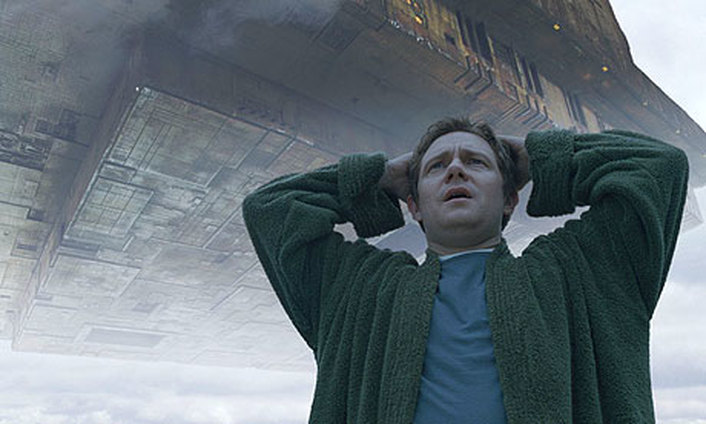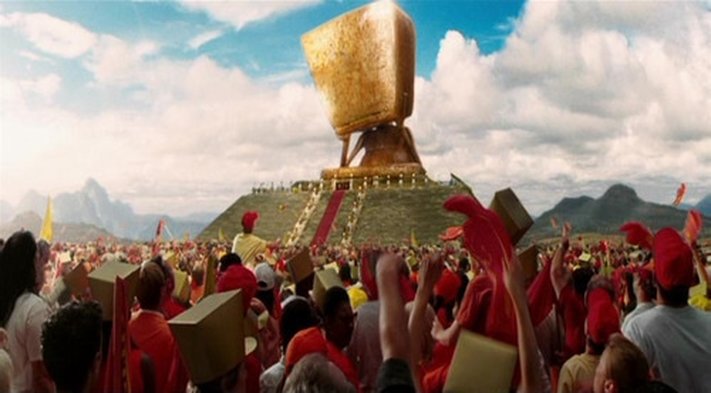
“So long, and thanks for all the fish!” sing a pod of dolphins as they depart planet Earth in the beginning of The Hitchhiker’s Guide to the Galaxy (Jennings, 2005). The dolphins departure signals the imminent destruction of the planet in this absurd space adventure. The film revolves around Arthur Dent, a rather plain Englishman whose house has been marked for destruction in order to build a bypass. At the same time, an intergalactic government run by the Vogons (a alien race of slimy, jowled caricatures of bureaucrats and politicians) has marked the Earth for destruction to build an intergalactic bypass. Dent is rescued from imminent doom, as the Earth is destroyed, by his best friend, Ford, an incognito alien. Ford and Dent catch a ride with the spaceship Heart of Gold, a craft under command by the self-kidnapped Galactic President Zaphod, an egotist searching for the the planet Magrathea. Accompanying the President is Trillian, a woman who once had a short relationship with Dent before she disappeared from Earth. The film follows the group’s journey across the galaxy as they search for the planet Magrathea and the supercomputer who contains the ultimate question to life, the universe, and everything. Like most book to film adaptations, the film departs from the written text in some ways, but the movie maintains the endearing characters and improbable technology from its textual source; however, the film begins to lose its Sci-Fi base as it switches to more of a Hollywood-esque romantic comedy in its concluding minutes.
The Hitchhiker’s Guide to the Galaxy (Jennings, 2005) is based on the 1979 novel of the same name. Penned by Douglas Adams, the book features mostly the same characters and plot structure. While most films depart in what some would consider negative ways from their textual counterparts, Adams wrote both the source material and the film’s screenplay, contributing to less of a discrepancy between the two works. However, there are a few departures from the original novel. For instance, in the film Trillian, played by Zooey Deschanel, is kidnapped by the vogons and becomes a damsel in distress for Dent to rescue. The Arthur Dent then comes to her aid in a valiant attempt that includes waiting in a DMV-style line and appropriating the correct form for her release. In the novel, the kidnapping and rescue simply do not occur. The Hitchhiker’s Guide to the Galaxy was also adapted into a radio and TV show prior to the film, and Adams approached each of them with slightly different plot elements leading to some self-contradiction between the adaptations. In a 1985 interview with David Letterman, Adams admitted that the story creates a sense of bafflement and confusion, so he tries to share that confusion with the readers ("Douglas Adams on David Letterman (14 February 1985)”).
The film also includes a large amount of technology and concepts that are confusing. To arrive at Magrathea, President Zaphod utilizes the improbability drive on the Heart of Gold. The improbability drive is a completely fictional engine that transports the ship through every possible location and time until it arrives somewhere in space. To explain this, the film utilizes an animated Hitchhiker’s Guide to show what the improbability drive does. This tool is employed throughout the film to visualize other impossible technologies such as a point-view-gun, the babel fish, and Deep Thought, the supercomputer that came up with the answer to “The Ultimate question of Life, the Universe, and Everything” (the answer, of course, being 42).
The Hitchhiker’s Guide to the Galaxy is an absurdly funny film that uses fantastical technology and endearing characters to encourage the audience to think deeply about their lives. The main characters of the film spend the majority of its runtime chasing a question so preposterously large and insignificant that it cannot possibly be found. Instead, Arthur finds his meaning in his interpersonal relationship with another human being. And although the film reverts to a romantic ending, Adams infuses a comedic touch into a fantastic intergalactic adventure.
Works cited
DJSolidSnail. "Douglas Adams on David Letterman (14 February 1985)." YouTube. YouTube, 09
July 2012. Web. 20 Feb. 2017.



 RSS Feed
RSS Feed
